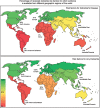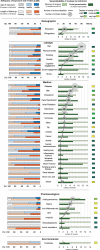A Systematic Review of Meta-Analyses that Evaluate Risk Factors for Dementia to Evaluate the Quantity, Quality, and Global Representativeness of Evidence
- PMID: 31306123
- PMCID: PMC6700718
- DOI: 10.3233/JAD-190181
A Systematic Review of Meta-Analyses that Evaluate Risk Factors for Dementia to Evaluate the Quantity, Quality, and Global Representativeness of Evidence
Abstract
Background: The translation of evidence on dementia risk factors into clinical advice requires careful evaluation of the methodology and scope of data from which risk estimates are obtained.
Objective: To evaluate the quantity, quality, and representativeness of evidence, we conducted a review of reviews of risk factors for Alzheimer's disease (AD), Vascular dementia (VaD), and Any Dementia.
Methods: PubMed, Cochrane library, and the Global Index Medicus were searched to identify meta-analyses of observational studies of risk factors for AD, VaD, and Any Dementia. PROSPERO CRD42017053920.
Results: Meta-analysis data were available for 34 risk factors for AD, 26 risk factors for Any Dementia and eight for VaD. Quality of evidence varied greatly in terms of the number of contributing studies, whether data on midlife exposure was available, and consistency of measures. The most evidence was available for cardiovascular risk factors. The most geographically representative evidence (five of six global regions) was available for alcohol, physical activity, diabetes, high midlife BMI, antihypertensives, and motor function. Evidence from Australia/Oceana or Africa was limited. With the exception of diabetes, meta-analysis data were unavailable from Latin America/Caribbean. Midlife specific data were only available for cholesterol and arthritis.
Conclusion: There is a lack of midlife specific data, limited data on VaD, and a lack of geographical representation for many risk factors for dementia. The quality, quantity, and representativeness of evidence needs to be considered before recommendations are made about the relevance of risk factors in mid- or late-life or for dementia subtypes.
Keywords: Alzheimer’s disease; cohort studies; meta-analysis; prevention; risk factor; vascular dementia.
Conflict of interest statement
Authors’ disclosures available online (
Figures
References
-
- Lopez AD, Mathers CD, Ezzati M, Jamison DT, Murray CJ (2006) Global and regional burden of disease and risk factors, 2001: Systematic analysis of population health data. Lancet 367, 1747–1757. - PubMed
-
- Leshner AI, Landis S, Stroud C, Downey A (2017) Preventing cognitive decline and dementia: A way forward. National Academies of Sciences, Engineering, and Medicine; Health and Medicine Division National Academies Press, Washington, DC. - PubMed
-
- Livingston G, Sommerlad A, Orgeta V, Costafreda SG, Huntley J, Ames D, Ballard C, Banerjee S, Burns A, Cohen-Mansfield J (2017) Dementia prevention, intervention, and care. Lancet 390, 2673–2734. - PubMed
-
- Williams JW, Plassman BL, Burke J, Holsinger T, Benjamin S (2010) Preventing Alzheimer’s Disease and Cognitive Decline. Evidence Report/Technology Assessment No. 193. (Prepared by the Duke Evidence-based Practice Center under Contract No. HHSA 290-2007-10066-I.) AHRQ Publication No. 10-E005. Agency for Healthcare Research and Quality, Rockville, MD.
Publication types
MeSH terms
Grants and funding
LinkOut - more resources
Full Text Sources
Medical




